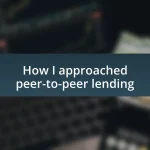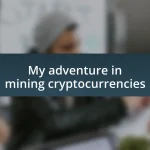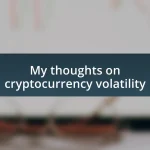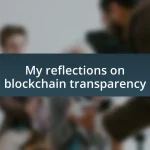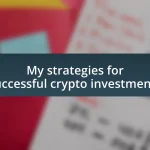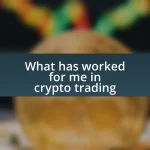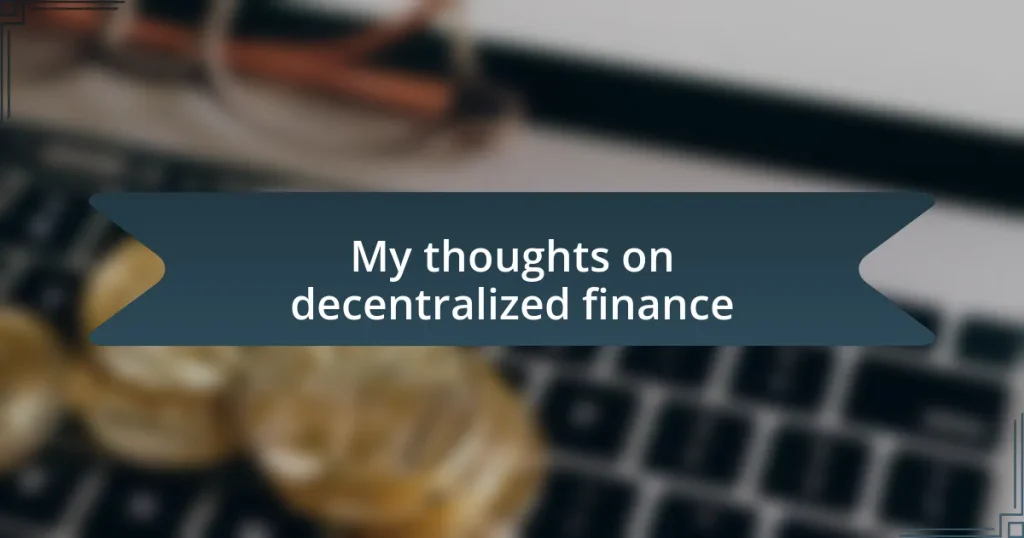Key takeaways:
- Decentralized finance (DeFi) enhances financial accessibility, enabling users to manage assets without traditional intermediaries.
- Key benefits of DeFi include lower transaction costs, greater control over assets, and increased earning potential through higher interest rates.
- Risks in DeFi involve security vulnerabilities, regulatory uncertainty, and potential fraud, necessitating cautious participation.
- Future trends in DeFi include the integration of AI, cross-chain interoperability, and a focus on sustainable finance, promoting ethical investment practices.
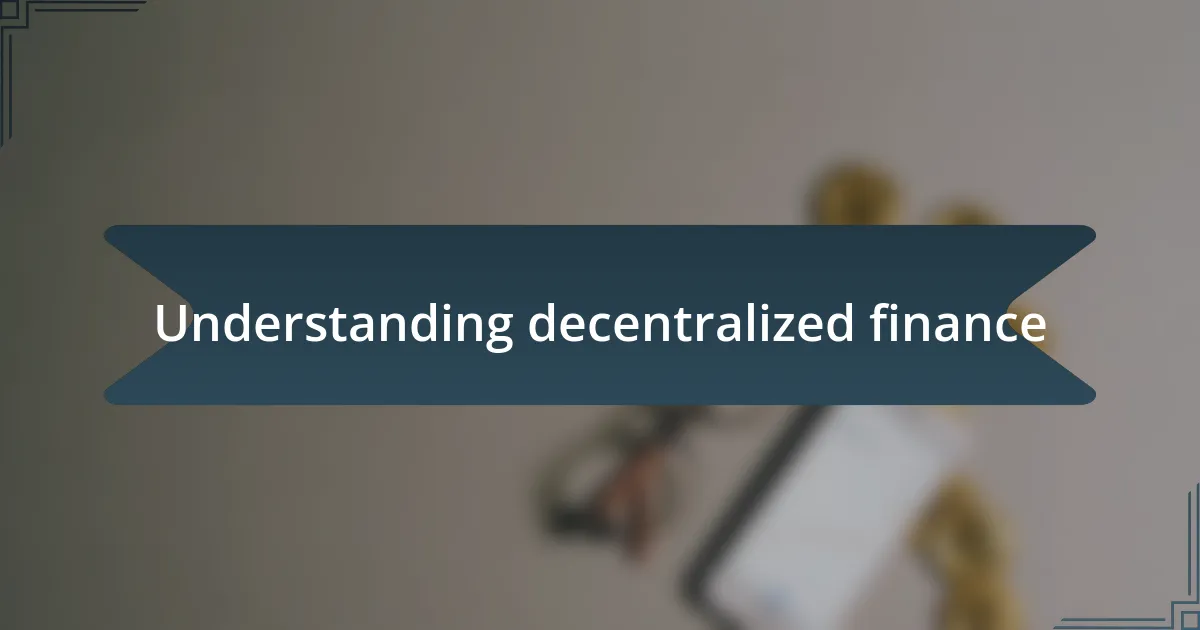
Understanding decentralized finance
Decentralized finance, often referred to as DeFi, operates on blockchain technology, which eliminates the need for traditional intermediaries like banks. I remember my first encounter with a DeFi platform; the feeling of empowerment was palpable as I realized I could lend and borrow without the constraints of traditional finance. Isn’t it fascinating how technology can empower individuals to manage their financial activities directly?
What sets DeFi apart is its transparency and accessibility. Every transaction is recorded on the blockchain, making it near impossible to manipulate or censor. The last time I tried to explain this to a friend, they were amazed that anyone with an internet connection could access financial services typically reserved for those with substantial capital. How cool is it that anyone, regardless of their financial background, can now participate in this ecosystem?
Engaging with DeFi also fosters a strong sense of community, as many projects encourage collaboration and open-source development. I was part of a discussion board where users exchanged tips on maximizing yield farming strategies, which sparked not just knowledge but genuine connections. Isn’t it great to think that decentralized finance can turn scattered individuals into a tight-knit community with shared goals and aspirations?
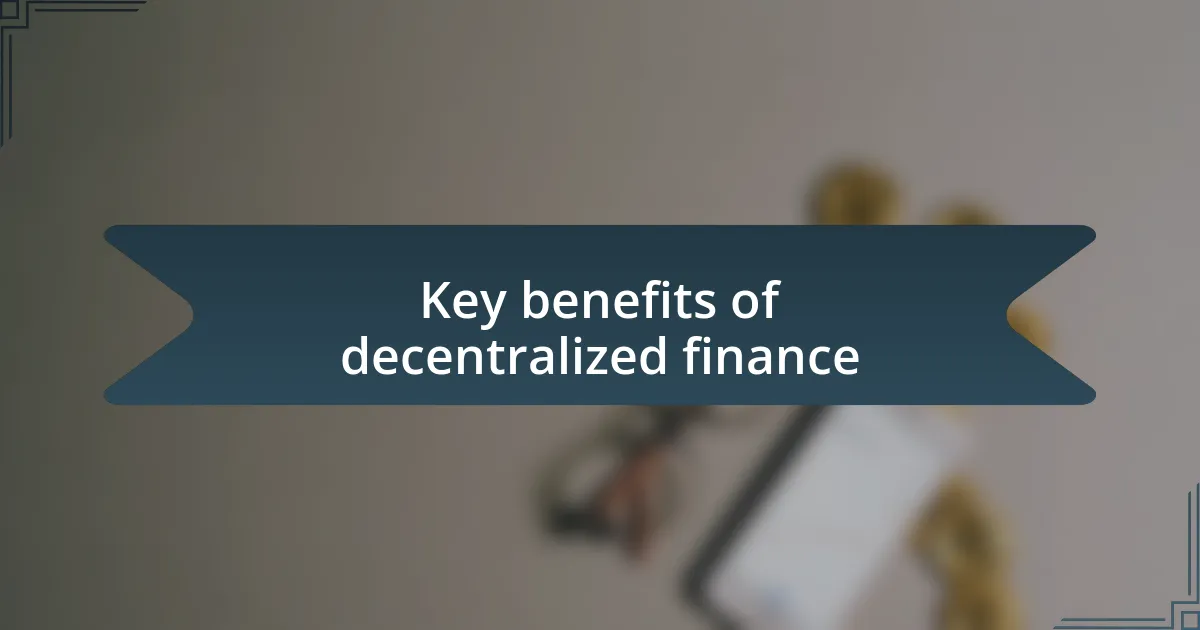
Key benefits of decentralized finance
Decentralized finance offers a range of benefits that are hard to overlook. One significant advantage is the reduction of fees often associated with traditional financial services. I remember when I used a DeFi lending platform for the first time; my excitement grew as I noticed how much I saved on transaction fees compared to my bank. It felt liberating to keep more of my money!
Some key benefits of decentralized finance include:
- Lower transaction costs: Less reliance on intermediaries translates to reduced fees.
- Enhanced accessibility: Anyone with an internet connection can access financial services.
- Greater control over assets: Users have direct ownership of their funds without needing a third party.
- Transparent processes: The blockchain’s open nature ensures that all transactions are verifiable and immutable.
- Increased earning potential: DeFi platforms often provide higher interest rates on savings compared to traditional banks.
The beauty of DeFi isn’t just in its mechanics; it’s in the opportunities it creates for everyone. A friend of mine recently joined a yield farming venture that turned out to be incredibly rewarding, leading to an unexpected financial windfall. She couldn’t stop smiling when sharing her experience, which reinforced how decentralized finance can transform lives in real, tangible ways. Isn’t it exhilarating to think about the possibilities ahead?
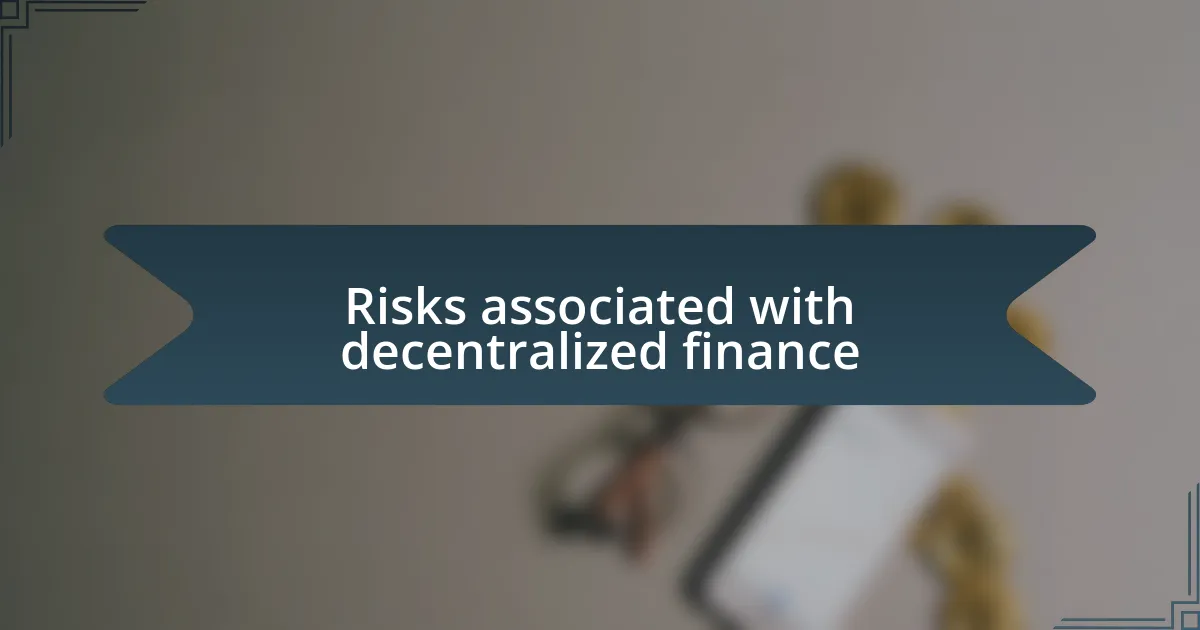
Risks associated with decentralized finance
Decentralized finance, while promising, carries a range of risks that users should understand. One of the most pressing concerns is security. I recall hearing about a friend who lost a significant amount of money due to a smart contract bug—it’s alarming how easily funds can be compromised if proper precautions aren’t taken. As someone who enjoys exploring this space, it’s essential for me to take security measures seriously.
Another noteworthy risk involves regulatory uncertainty. The landscape of regulations surrounding DeFi is still evolving, which leaves us in a position of ambiguity. When I first started investing in DeFi tokens, I felt a mix of excitement and anxiety, especially with news of government scrutiny. The fear that changes in regulations could impact my investments made me more cautious and driven to stay informed.
Moreover, there’s the risk of scams and outright fraud. In my early days in DeFi, I encountered several projects that seemed too good to be true. Trusting these ventures led to lost funds and frustration. It’s a reminder of how critical it is to perform thorough research before diving headfirst into new platforms.
| Type of Risk | Description |
|---|---|
| Security Risks | Vulnerabilities in smart contracts can lead to loss of funds. |
| Regulatory Risks | Changing regulations can create uncertainty for users. |
| Fraud Risks | The existence of scams can deceive naive investors. |
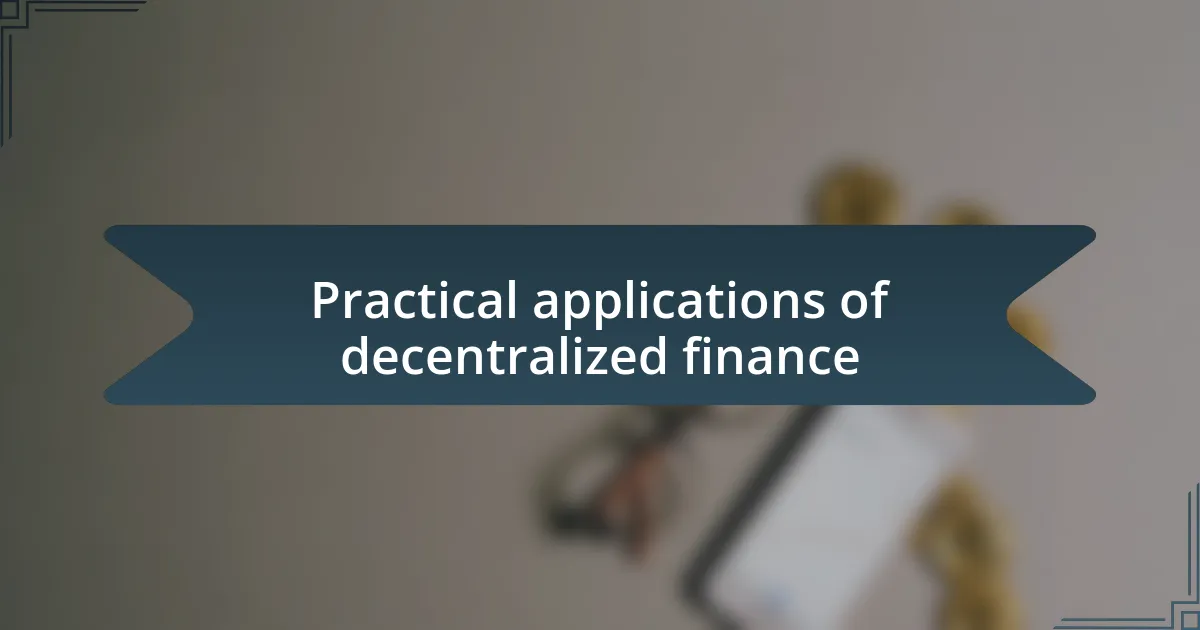
Practical applications of decentralized finance
The practical applications of decentralized finance (DeFi) are exciting and diverse. One of the standout uses I’ve come across is lending protocols. I remember the first time I used one; it felt revolutionary to earn interest on my crypto assets without relying on traditional banks. It was a game-changer, allowing me to leverage my digital assets for liquidity easily.
Another remarkable application is decentralized exchanges (DEXs). I still recall the thrill of trading directly from my wallet without needing a centralized intermediary. The control I felt over my transactions was empowering. Plus, the variety of tokens available pushed me to explore new projects that I’d never consider using conventional exchanges.
Lastly, one cannot overlook yield farming. I was hesitant at first but decided to give it a try. The prospect of maximizing returns by participating in liquidity pools proved to be quite rewarding, though it required honing my skills in navigating these protocols. Engaging in yield farming is like playing a strategic game, where understanding the market’s mechanics can significantly increase your profits. Isn’t it fascinating how DeFi reshapes our approach to investing?
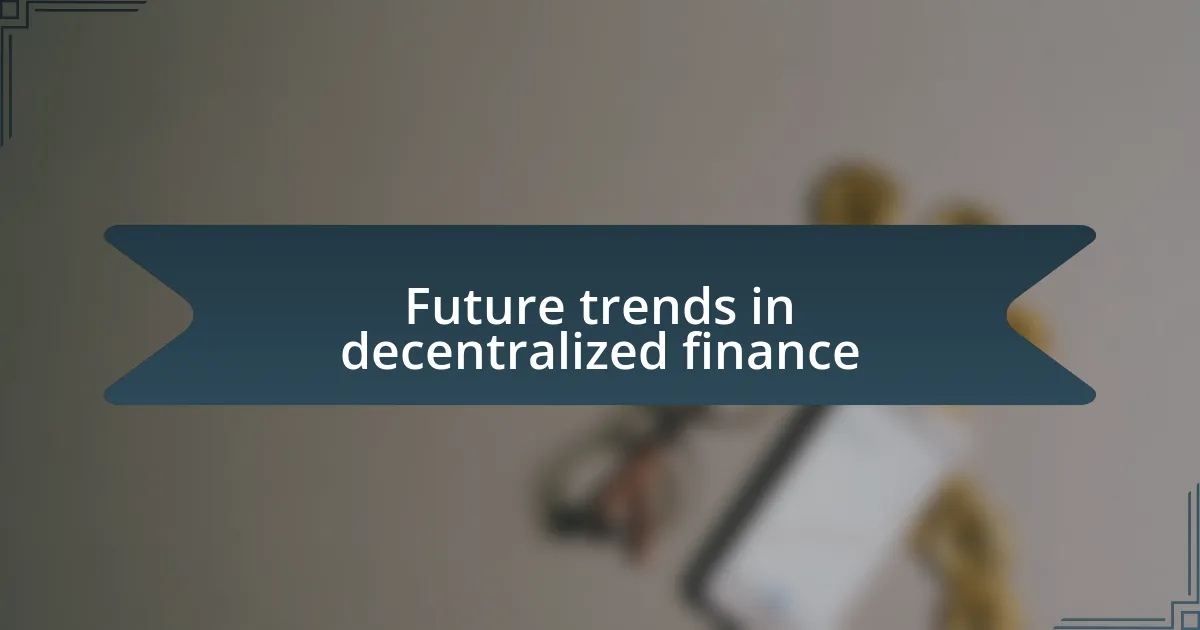
Future trends in decentralized finance
As I look toward the future of decentralized finance, I can’t help but feel a sense of excitement about the integration of artificial intelligence (AI) in DeFi platforms. Imagine AI algorithms predicting market trends and helping users make informed decisions about their investments—it almost feels like having a financial advisor in your pocket. I find it fascinating how combining AI with DeFi can enhance user experience by providing personalized recommendations, making the complex world of finance more accessible.
Moreover, the rise of cross-chain interoperability is something I believe will revolutionize how transactions occur in the DeFi space. I remember feeling frustrated by the limitations of sticking to one blockchain, but the emerging technology allows assets to flow seamlessly across different chains. This not only enhances liquidity but also fosters greater collaboration among various projects, which I believe can lead to innovative solutions.
Sustainable finance is another trend that resonates with me personally. As I explore the ecological impacts of our financial decisions, I see a growing emphasis within DeFi on creating environmentally-friendly protocols. Every time I think about how we can align our investments with our values, I feel hopeful. With the shift toward greener solutions and social responsibility in finance, it’s exciting to imagine a future DeFi landscape that prioritizes both profitability and ethical considerations. How can we not be inspired by such a transformative journey?
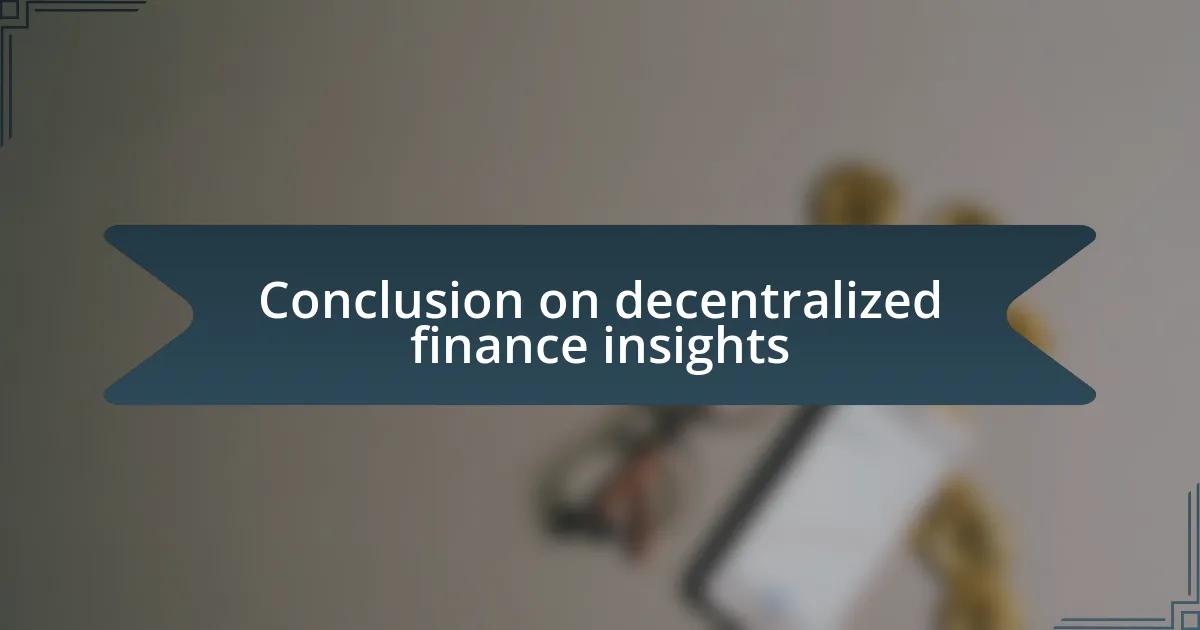
Conclusion on decentralized finance insights
Reflecting on decentralized finance, it’s clear to me that we’re on the brink of a paradigm shift in how we perceive and engage with financial systems. I remember my own awakening to the inefficiencies of traditional finance—suddenly, DeFi offered a new narrative of empowerment and democratization. Isn’t it fascinating how these platforms allow users to bypass the middleman, giving them direct control over their financial assets?
I can’t help but emphasize the importance of community in the DeFi space. Many times, I’ve been part of discussions where insights are shared freely, fostering a collaborative environment that feels refreshing compared to the often siloed conversations in traditional finance. This sense of community not only enriches the user experience but also drives innovation through collective knowledge. Could it be that our shared experiences will shape the future of finance in ways we’re only beginning to understand?
Ultimately, I see decentralized finance as both a challenge and an opportunity. As we navigate this uncharted territory, I find myself asking: how will we balance this incredible potential with the need for regulatory frameworks? By engaging actively in the conversation and advocating for responsible practices, I believe we can harness the power of DeFi while addressing the concerns that come with rapid innovation. It’s a thrilling journey, and I’m eager to see where it leads us.

